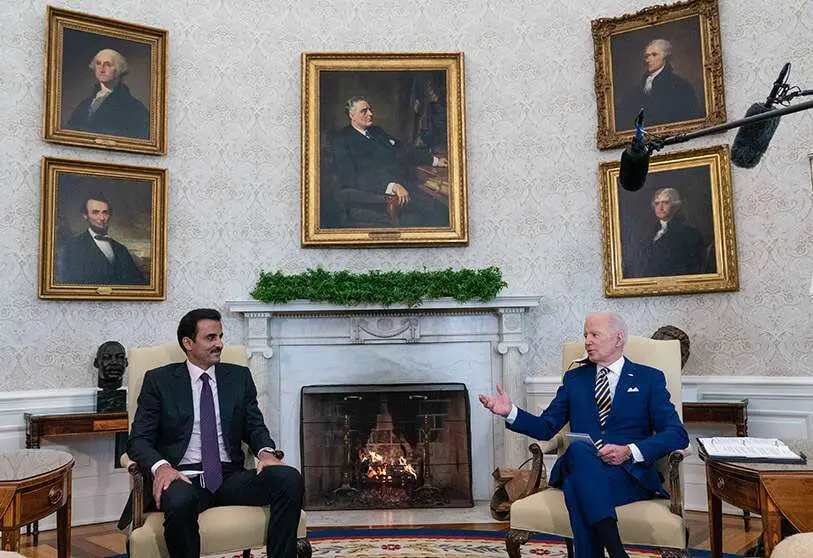Washington and Tehran to resume indirect negotiations in Qatar

The state of Qatar has once again become a key player in the nuclear negotiations between Iran and the other countries of the Joint Comprehensive Plan of Action (JCPOA). On this occasion, the small Gulf territory will be in charge of hosting the indirect talks between Washington and Tehran, more than three months after the disagreements between the two powers stalled the progress made in Vienna.
"Iran has chosen Qatar to host the talks because of the friendly ties between Doha and Tehran," Mohamed Marandi, media adviser to the Iranian nuclear team, told the Persian news agency ISNA. This close relationship was already evident when the Qatari emir, Sheikh Tamim bin Hamad Al Thani, visited the Iranian capital in March with the aim of bringing the two sides closer together on the nuclear deal.

The Qatari meeting was announced late last week by EU High Representative for Foreign Affairs and Security Policy Josep Borrell after his meeting in Tehran with Iranian Foreign Minister Hossein Amir-Abdollahain to end the "impasse" in the talks. "Since these are bilateral contacts between Iran and the United States, we prefer to do it somewhere else (other than Vienna) so as not to create confusion," Borrell said, referring to issues such as the implementation of the measures, the guarantees of the agreement, or the situation of the Revolutionary Guard, which will be dealt with bilaterally without the presence of Germany, France, the United Kingdom, Russia and China.
Important outcome of my visit to #Iran is that we deblocked recent deadlock and that halted Joint Comprehensive Plan of Action #JCPOA negotiations will resume.https://t.co/NY2OFa2eGA pic.twitter.com/Lq7dRvC4Vp
— Josep Borrell Fontelles (@JosepBorrellF) June 25, 2022
It is precisely this branch of the Iranian armed forces, the Islamic Revolutionary Guard Corps, that has been one of the main obstacles in the nuclear negotiations, which came to a standstill last March after more than a year of dialogue. While Tehran insists that Washington remove the body from the Foreign Terrorist Organisation (FTO) list, the White House has maintained this position as a red line. However, Reuters news agency reported that a Persian and a European official said that Iran had dropped this demand, although the sanctions issues have yet to be resolved.

"The resumption of talks does not mean that the agreement is close to being restored, as this depends on the will of the United States," warned Mohamed Marandi. "The signing of the agreement is conditional on the removal of sanctions with acceptable guarantees for Iran", since, according to the Iranian media advisor, the country is "fully committed to the nuclear deal". Something that, he criticised, was not shared by Washington, which unilaterally abandoned it in 2018.
"The ball is now in the court of the United States," said Iranian Foreign Ministry spokesman Saeed Khatibzadeh.

US special envoy for Iranian affairs Robert Malley and Iran's chief nuclear negotiator Ali Bagheri Kani will meet in Doha later this week, sources report. "Robert Malley is expected to arrive in Doha on Monday to meet Qatar's foreign minister (Mohammed bin Abdulrahman Al Thani)," sources close to the visit said.
At the same time, an official from the Islamic Republic of Iran told Reuters that Ali Bagheri Kani will also be in the Qatari capital on 28-29 June, coinciding with the US envoy's stay.

"We will see if an agreement is finally reached in the coming weeks," said Iranian foreign ministry spokesman Saeed Khatibzadeh, reiterating on more than one occasion that "the talks will be indirect", with European and Qatari representatives acting as intermediaries.
"Iran's nuclear advances can be reversed, as long as Washington fulfils its obligations", Khatibzadeh added, referring also to Iran's violation of the Nuclear Agreement's clauses limiting uranium production purity to 3.67% and total stockpiles to 202.8 kg. These figures have been far exceeded by Tehran in recent years since former US President Donald Trump announced Washington's unilateral exit from the JCPOA.

"The US has already shown that it cannot be trusted and does not live up to its commitments," Khatibzadeh condemned. "We have taken these negotiations seriously, but the biggest guarantee is our country's capabilities," he warned.
Americas Coordinator: José Antonio Sierra










